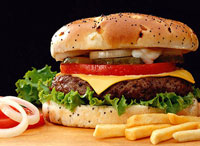McDonald's and Burger King Kill Russian Bistro
McDonald's started its expansion to Russia by opening its restaurant in the downtown Moscow. 20 years later, its main competitor - Burger King - is starting its business in Moscow suburbs, reports Kommersant.

The first Burger King restaurant will open in the food court of one of Moscow’s Mega shopping malls.
According to Andrey Petrakov, executive director of Restcon company, it is the right time for the chain to expand into the Russian market. The market has enough room for new players, the crisis is subsiding, and rental prices have dropped.
The expert believes that Burger King has a good potential and may become a federal brand in Russia. The reason for optimism is the lack of alternative in the fast food market that could compare in quality with McDonald's. McDonald's is shifting to 24/7 schedule to be able to serve all its customers. It will take a while for Burger King to get to that level. Experts think that if everything goes well, within 5 years Burger King has a good chance of getting a stable position in the market and co-existing with McDonald's.
Burger King chain comprises 11.7 thousand restaurants in the USA and 75 other countries. Burger King first announced its intention to expand into the Russian market in the summer of 2008. In February 2009, Burger King registered its first Russian affiliate, LLC Burger King Rus.
Why Russian Bistro failed
There were earlier attempts to create a worthy competitor for McDonald's in Russia. The chain Russian Bistro was designed by the Mayor of Moscow as a direct competitor of the American monster chain.
It was opened in 1995. After the crisis of 1998, the chain suffered losses “due to a number of management mistakes.” In 2005, Moscow government transferred the managerial tasks to Arpikom Company, which started leasing the snack shops out.
However, pirozhki and artificial beverages from Russian Bistro never became a preferred alternative to hamburgers and thick milkshakes.
Kommersant wrote that the slogan "It does not hurt to try" is very appropriate for Russian Bistro. Luzhkov realized sooner than others that Russian national idea is there, it just needs to be defined.
Restaurants offering traditional Russian cuisine are widely popular, while fast food joints are not. Russian fast food is an oxymoron. Historically, Russian food consumption is a “lengthy” procedure, with people sitting at a table for long periods of time.
Poor variety – pirozhki, salads and soups – was forgivable. The real problem was that the looks of borsch alone were enough to make a person lose appetite and any desire to try Russian cuisine. “Borsch” was made out of purple powder dissolved with hot water and poured into tiny plastic cups the size of a baby’s hand. Other “infusions” were prepared the same way.
In order to save the idea of Russian Bistro, its management resorted to desperate measures that involved adding alcoholic beverages to the menu. This measure finally destroyed the Russian fast food chain.
Kommersant
Russia Today: I'm smoking it!
Subscribe to Pravda.Ru Telegram channel, Facebook, RSS!





